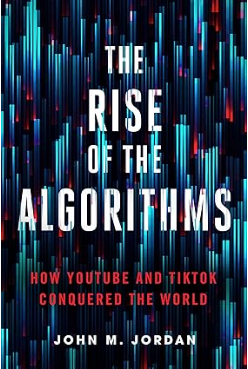
Book Bits: 23 March 2024

” In this interview with The Diplomat, Ingleson, an assistant professor of international history at the London School of Economics, explores how the shift toward neoliberal capitalism in the 1970s and 1980s rewrote the dynamics of China-U… “In order for China to converge with global capitalism…
 ● The Rise of the Algorithms: How YouTube and TikTok Conquered the World
● The Rise of the Algorithms: How YouTube and TikTok Conquered the World
John M. Jordan
Summary via publisher (Penn State U. Press)
The meteoric rise of online video is reshaping the competition for human attention. The Rise of the Algorithms argues that this new technology has changed the way we interact with others, our relationships with public institutions, and our very own behaviors and psyches. In tracing the origins and evolution of online video, John M. Jordan examines the mechanics—and the ethical stakes—of online video platforms, especially YouTube and TikTok but also others, such as Twitch. Tracing the use of algorithms pioneered by Facebook and Google and so successfully exploited by TikTok’s corporate parent, ByteDance, Jordan shows how these platforms now engineer human behavior—with consequences for culture, politics, and identity. Jordan argues that we are at an inflection point. Until now we have proved, as a society, ill-prepared or unwilling to address such problems as the power of digital platforms, the personal cost of viral celebrity, the invasion of privacy, and the proliferation of disinformation.
 ● Made in China: When US-China Interests Converged to Transform Global Trade
● Made in China: When US-China Interests Converged to Transform Global Trade
Elizabeth O’Brien Ingleson
Q&A with author via The Diplomat
Elizabeth O’Brien Ingleson delves into this seismic transformation in her new book, “Made in China: When US-China Interests Converged to Transform Global Trade.” In this interview with The Diplomat, Ingleson, an assistant professor of international history at the London School of Economics, explores how the shift toward neoliberal capitalism in the 1970s and 1980s rewrote the dynamics of China-U.S. trade – and ultimately China-U.S. relations.
“In order for China to converge with global capitalism, the United States – the largest and most powerful player in the capitalist system – needed to accommodate China’s needs,” she explained. And that is story that unfolded in boardrooms and factory floors on both sides of the Pacific Ocean.
 ● Paper Soldiers: How the Weaponization of the Dollar Changed the World Order
● Paper Soldiers: How the Weaponization of the Dollar Changed the World Order
Saleha Mohsin
Review via Axios
Some of the most important instruments of U.S. global power are deployed not by the warfighters at the Pentagon or the diplomats at the State Department, but by bureaucrats at 1500 Pennsylvania Avenue — the U.S. Treasury Department.
The big picture: A new book out this week brings to life the narrative of how Treasury officials have used the U.S. dollar as a tool of American foreign policy over the last three decades — along with the hazards that has created.
 ● Cycles: The Mysterious Forces That Trigger Events
● Cycles: The Mysterious Forces That Trigger Events
Edward R. Dewey
Summary via publisher (Harriman House)
Edward R. Dewey, as chief economist in the Hoover Administration, was tasked by President Hoover to figure out what caused the 1929 stock market crash and ensuing depression. In the course of his extensive investigations, he became convinced that something important was missing from our collective knowledge of how economies and societies work—a working knowledge of cycles. He was joined in his quest to establish a “science of cycles” by other leaders of his time, including Ivy League scientists, Smithsonian Directors, Industrial CEOs, Ambassadors, and political leaders. First published in 1971, Cycles: The Mysterious Forces that Trigger Events was Dewey’s answer to President Hoover’s question and to many more questions which had arisen from his decades of research. Are there cycles in nature? In war? On Wall Street? In the universe? In you? Are cycles across different phenomena aligned with each other?
 ● Behind the Startup: How Venture Capital Shapes Work, Innovation, and Inequality
● Behind the Startup: How Venture Capital Shapes Work, Innovation, and Inequality
Benjamin Shestakofsky
Summary via publisher (U. of California Press)
This systematic analysis of everyday life inside a tech startup dissects the logic of venture capital and its consequences for entrepreneurs, workers, and societies. In recent years, dreams about our technological future have soured as digital platforms have undermined privacy, eroded labor rights, and weakened democratic discourse. In light of the negative consequences of innovation, some blame harmful algorithms or greedy CEOs. Behind the Startup focuses instead on the role of capital and the influence of financiers. Drawing on nineteen months of participant-observation research inside a successful Silicon Valley startup, this book examines how the company was organized to meet the needs of the venture capital investors who funded it.
Please note that the links to books above are affiliate links with Amazon.com and James Picerno (a.k.a. The Capital Spectator) earns money if you buy one of the titles listed. Also note that you will not pay extra for a book even though it generates revenue for The Capital Spectator. By purchasing books through this site, you provide support for The Capital Spectator’s free content. Thank you!
Author: James Picerno
